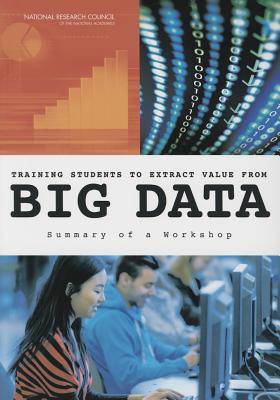
- Retrait gratuit dans votre magasin Club
- 7.000.000 titres dans notre catalogue
- Payer en toute sécurité
- Toujours un magasin près de chez vous
- Retrait gratuit dans votre magasin Club
- 7.000.0000 titres dans notre catalogue
- Payer en toute sécurité
- Toujours un magasin près de chez vous
Training Students to Extract Value from Big Data
Summary of a Workshop
National Research Council, Division on Engineering and Physical Sciences, Board on Mathematical Sciences and Their Applications, Committee on Applied and Theoretical StatisticsDescription
As the availability of high-throughput data-collection technologies, such as information-sensing mobile devices, remote sensing, internet log records, and wireless sensor networks has grown, science, engineering, and business have rapidly transitioned from striving to develop information from scant data to a situation in which the challenge is now that the amount of information exceeds a human's ability to examine, let alone absorb, it. Data sets are increasingly complex, and this potentially increases the problems associated with such concerns as missing information and other quality concerns, data heterogeneity, and differing data formats.
The nation's ability to make use of data depends heavily on the availability of a workforce that is properly trained and ready to tackle high-need areas. Training students to be capable in exploiting big data requires experience with statistical analysis, machine learning, and computational infrastructure that permits the real problems associated with massive data to be revealed and, ultimately, addressed. Analysis of big data requires cross-disciplinary skills, including the ability to make modeling decisions while balancing trade-offs between optimization and approximation, all while being attentive to useful metrics and system robustness. To develop those skills in students, it is important to identify whom to teach, that is, the educational background, experience, and characteristics of a prospective data-science student; what to teach, that is, the technical and practical content that should be taught to the student; and how to teach, that is, the structure and organization of a data-science program.
Training Students to Extract Value from Big Data summarizes a workshop convened in April 2014 by the National Research Council's Committee on Applied and Theoretical Statistics to explore how best to train students to use big data. The workshop explored the need for training and curricula and coursework that should be included. One impetus for the workshop was the current fragmented view of what is meant by analysis of big data, data analytics, or data science. New graduate programs are introduced regularly, and they have their own notions of what is meant by those terms and, most important, of what students need to know to be proficient in data-intensive work. This report provides a variety of perspectives about those elements and about their integration into courses and curricula.
Spécifications
Parties prenantes
- Auteur(s) :
- Editeur:
Contenu
- Nombre de pages :
- 66
- Langue:
- Anglais
Caractéristiques
- EAN:
- 9780309314374
- Date de parution :
- 16-02-15
- Format:
- Livre broché
- Format numérique:
- Trade paperback (VS)
- Dimensions :
- 173 mm x 249 mm
- Poids :
- 158 g

Les avis
Nous publions uniquement les avis qui respectent les conditions requises. Consultez nos conditions pour les avis.






